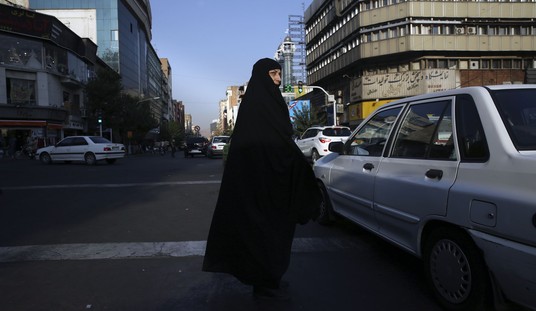And the rest of the world says no kidding, regardless of the drone. Hamas may manufacture some of its missiles and rockets, but it’s also been clear for years that they get substantial assistance from Tehran, as well as perhaps Pyongyang. This morning, Benjamin Netanyahu announced that the IDF downed an armed drone, apparently launched from either Syria or Iraq, made and run by Iran:
JUST IN – Israel's Netanyahu: The true backer of much of this aggression is Iran. They provide financing and weapons to Hamas and Hezbollah. They sent an armed drone to Israel from Iraq or Syria.pic.twitter.com/RjI9eSnwLz
— Disclose.tv 🚨 (@disclosetv) May 20, 2021
Israeli Prime Minister Benjamin Netanyahu said Thursday that Israel has intercepted a drone sent by Iran.
The drone was dispatched from either Iraq or Syria and intercepted at Israel’s border with Jordan, Netanyahu said at a meeting with German Foreign Minister Heiko Mass in Tel Aviv, according to Bloomberg.
Netanyahu, however, did not provide evidence to bolster his claim, other than holding what he said was part of the unmanned aircraft, the outlet noted.
The prime minister accused Iran of backing and financing the Islamic Jihad in Gaza, in addition to providing weapons to the Palestinian militant group Hamas and the Lebanese militant group Hezbollah, Bloomberg reported.
Presumably the IDF will provide the evidence from the drone shortly. If that turns out to be a legitimate claim, it will remind Israel’s neighbors that the threat from Iran is as dangerous as ever. And the occasional rocket lob from southern Lebanon also bolsters Netanyahu’s case, also irrespective of the drone’s origin.
Netanyahu might have a domestic audience in mind, though. Eleven days into the rocket barrage from Hamas, the opposition parties are balking. Opposition leader Yair Lapid accused Netanyahu today of ruining the US-Israeli relationship by continuing the IDF strikes in Gaza:
Israeli opposition leader Yair Lapid criticized Prime Minister Benjamin Netanyahu for what he said was failure to heed the requests of the U.S. government to call for a cease-fire with Hamas, saying Netanyahu is putting the U.S.-Israel relationship in jeopardy.
The U.S. has called for Israel to end the fighting and agree to a cease-fire. Netanyahu has refused the requests, and appears determined to inflict maximum damage against Hamas in a war that could save his political career, the Associated Press reported.
Lapid criticized Netanyahu on Facebook for failing to develop a concrete policy regarding the Gaza Strip.
“After 11 days of this operation, every Israeli citizen will ask themselves: What did the government really want to achieve with this military operation? What is its policy and strategic long-term aim concerning Hamas in Gaza?” Lapid wrote.
I’m not sure why Lapid is that concerned now about Netanyahu’s relationship with Joe Biden. Nor do I think that’s a big concern for Israeli voters at the moment, especially those within range of Hamas’ rockets. However, the longer this drags on, the more room Lapid and other opponents of Netanyahu’s caretaker-ish government will have to publicly criticize his handling of the conflict.
Netanyahu can at least take comfort in the fact that he’s not alone in internal politicking. Hamas is leveraging the fight to essentially call Mahmoud Abbas and Fatah cowards:
From Gaza, Hamas has called on Palestinians in these two other Palestinian territories to intensify their uprising against Israeli personnel deployed there. However, the West Bank-based Palestinian leadership, led by Palestinian National Authority President Mahmoud Abbas, head of the left-wing Fatah party, has been cautious to call for open resistance.
Hamas, Fatah’s top rival, says it expects more from them.
“It seems that the Palestinian Authority and Fatah are currently in a hibernation,” the Hamas spokesperson told Newsweek.
And this gets down to the real reason for Hamas’ war on Israel at this time:
Hamas’ sustained popularity loomed over what would have been the first Palestinian elections in 15 years scheduled for last month, but Abbas postponed the vote, citing Israel’s refusal to allow elections in Jerusalem.
Hamas decried the move as “a coup.”
In essence, this is a political campaign between two terrorist groups. Hamas wants to be seen as the true defenders of the Al-Aqsa Mosque and the party that will reverse the nabka of 1948. They’re showing a down payment on their annihilationism if they ever win outright control of the Palestinian Authority — which Iran wants as badly as it wants anything in the region.








Join the conversation as a VIP Member